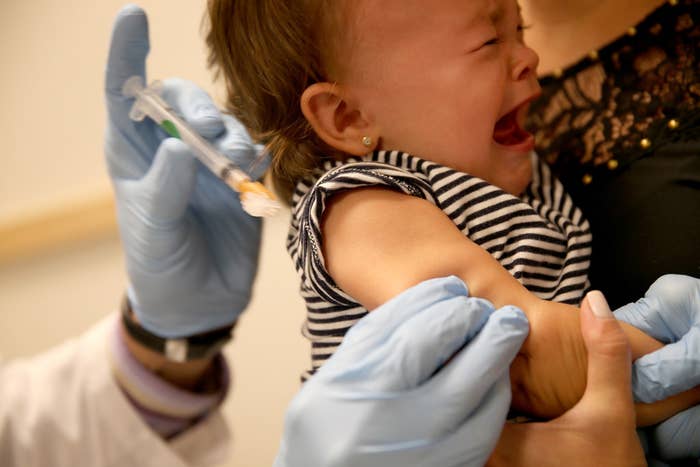
In the midst of the Disneyland measles outbreak, with more than 100 people infected, many U.S. parents may be wondering: Can I sue people who chose not to vaccinate their kid?
To win a civil lawsuit, you would need to prove that a parent's actions — or in this case, inactions — were responsible for specific harm. Say, for example, that your baby, too young to get a measles vaccine, got sick after catching the virus from an older child at a daycare center.
In that case, sure, you could sue the unvaccinated child's parents (this is America, after all). But you almost certainly wouldn't win, according to several legal experts.
"Under the current law it's really unlikely," John Conley, a law professor at the University of North Carolina, told BuzzFeed News. "But there are a couple of legal theories that you might use."
The most plausible approach is to sue for negligence.
Under U.S. common law, which is set by precedent instead of any particular statute, there is no "duty to rescue." That means that if you're walking by a man who's clearly drowning, you have no legal obligation to jump in and save him. (Interestingly, though, if you begin to rescue him then you are obligated to do your best to carry it out. "It's almost like no good deed goes unpunished," Conley said.)
Negligence cases hinge on a slightly different principle: Your behaviors shouldn't expose others to unreasonable risks. Homeowners, for example, have a duty to shovel the snow off their sidewalk. If you fail to meet that duty (as John Kerry did last week), and your neighbor then slips on your sidewalk and breaks an arm, you could get sued for negligence.
But proving negligence would be a lot more difficult in the case of the parents who chose not to vaccinate their kids. The biggest hurdle is that almost every state allows parents to get out of mandatory school vaccinations if they have religious objections. And 20 states, including California, allow more ambiguous "philosophical exemptions" as well.
"It's very hard to claim that somebody who's doing something allowed by state law is negligent," Conley said.
Even in the states without those exemptions, it would be tough to prove liability.
As Nicholas Diamond and his colleagues wrote in 2013, you would have to show scientific evidence that the unvaccinated child in question was the direct cause of the harm done to your child. "Given enough time, given enough samples and examination, you can pretty much trace an instance of contracting measles back to patient zero, back to where it started," Diamond told BuzzFeed News.
In the California outbreak, though, it may not be that simple. Many unvaccinated children have caught the measles, and scientists have not yet figured out who the first case was, Mary Holland, a research scholar at the New York University School of Law, told BuzzFeed News. "It's not practical to sue somebody."
What's more, Holland added, because the vaccine is not 100% effective, in rare cases vaccinated people could also spread disease. Would they then also be liable?
There are other, even less plausible strategies for legal action.
You could file a public nuisance claim, for example, which charges that someone is harming or annoying the public at large. These claims are usually brought against people for throwing loud parties, setting off fireworks in the street, or keeping a dangerous animal. But they could conceivably be used in a vaccination case, Conley said.
Even more "far-fetched," he added, would be to make a criminal assault claim. This approach has been famously used in a handful of cases of people infected with HIV. Two years ago, for example, a former professional wrestler was sent to prison for 32 years for not telling his sexual partners he had HIV. To use this legal strategy in vaccine cases, you would have to argue that parents of unvaccinated children were intentionally putting others at risk, "almost as if you're using your unvaccinated child as a weapon," Conley said.
Regardless of how difficult it may be to win any of these hypothetical lawsuits, all of these legal experts agree that it's only a matter of time before one is filed.
"In the face of what is understandably an extremely emotional and heart-wrenching thing," Diamond said, "people get upset and they look around for a remedy."
